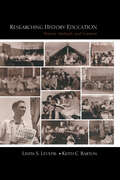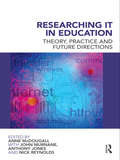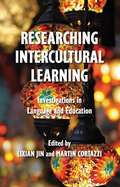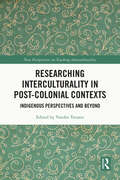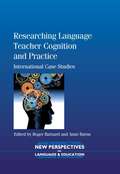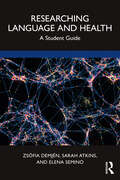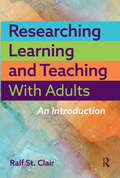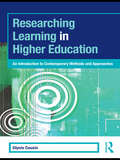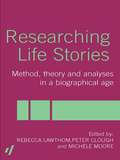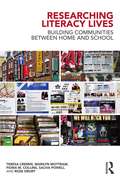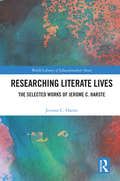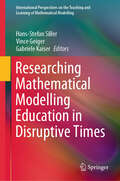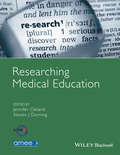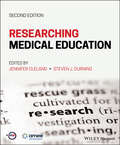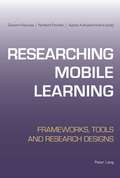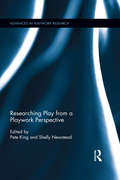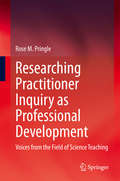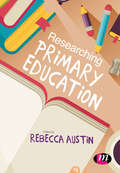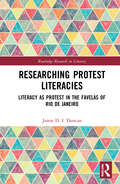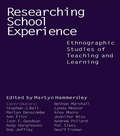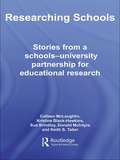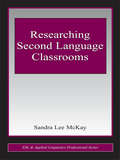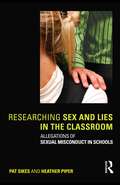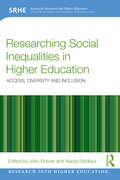- Table View
- List View
Researching History Education: Theory, Method, and Context
by Keith C. Barton Linda S. Levstik"The authors’ research is well known and among the most important American works being done on how children learn history. It is thus a great idea to gather this pivotal research in one place. The volume offers a new perspective through the authors’ reflections on the research process. It is profound without pomposity, ideal for the intended audience; the tone is just right. There really isn’t another book that does what this one does." Stephen J. Thornton, University of South Florida Researching History Education combines a selection of Linda Levstik’s and Keith Barton’s previous work on teaching and learning history with their reflections on the process of research. These studies address students’ ideas about time, evidence, significance, and agency, as well as classroom contexts of history education and broader social influences on students’ and teacher’s thinking. These pieces—widely cited in history and social studies education and typically required reading for students in the area—were chosen to illustrate major themes in the authors’ own work and trends in recent research on history education. In a series of new chapters written especially for this volume, the authors introduce and reflect on their empirical studies and address three issues suggested in the title of the volume: theory, method, and context. Although research on children’s and adolescents’ historical understanding has been the most active area of scholarship in social studies in recent years, as yet there is little in-depth attention to research methodologies or to the perspectives on children, history, and historical thinking that these methodologies represent. This book fills that need. The authors’ hope is that it will help scholars draw from the existing body of literature in order to participate in more meaningful conversations about the teaching and learning of history. Researching History Education provides a needed resource for novice and experienced researchers and will be especially useful in research methodology courses, both in social studies and more generally, because of its emphasis on techniques for interviewing children, the impact of theory on research, and the importance of cross-cultural comparisons.
Researching IT in Education: Theory, Practice and Future Directions
by Anne McDougallSerious criticisms of research on IT in education have been published recently in both the UK and the USA. Researching IT in Education aims to provoke thought and discussion among practising researchers by considering a range of approaches to undertaking quality research. Establishing priorities and directions for future research in the sub-discipline of IT in education, the book is structured around five foci: theory history research directions methodology research topics. This book argues for the enormous power of IT to enable fundamental research that both refines and develops theory and practice in education. High quality research that advances knowledge and educational practice in this area will generally require longer timelines and more complex data collection and analysis methods. The authors draw attention to the value of theoretical frameworks used in mainstream educational research and highlight the early theoretical work on the subject of IT in education. Researching IT in Education is the only book in its area to focus on methodological and research design issues. The individual chapters are contributed by expert researchers and leaders in the field from ten countries, thus providing an unusually broad but coherent international set of perspectives for the issues examined in the book. This book will benefit anyone interested in or undertaking research on IT in education, including academics, research students, teachers and policy-makers.
Researching Intercultural Learning
by Lixian Jin Martin CortazziInternational perspectives on intercultural learning are presented within a framework of cultures of learning related to education and language learning and use in academic contexts. Intercultural learning involves learners travelling to learn in a place where other cultures of learning are dominant and to which they are usually expected to adapt.
Researching Interculturality in Post-Colonial Contexts: Indigenous Perspectives and Beyond (New Perspectives on Teaching Interculturality)
by Vander TavaresThis volume critically explores intercultural "encounters" between Indigenous and Eurocentric education in the post-colonial contexts of Brazil, Chile, and Mexico.In this book, interculturality in education is considered in a variety of educational and social settings, including teacher, community, secondary, and higher education, as well as language revitalization efforts, from a wide range of analytical and methodological perspectives. The contributors examine historical and emerging challenges in initiatives to expand or redesign education through interculturality/ies, highlighting the work that remains on the educational agenda while also identifying obstacles perpetuated by ideologies of monoculturalism, neoliberalism, and capitalism. Several case studies are presented to showcase pedagogical creativity, curricular innovation, and epistemological plurality in intercultural education and research. The volume also includes two expert transcultural commentaries that approach the challenges and opportunities in a comparative way, drawing on Indigenous perspectives beyond the three countries studied. This book argues for a critical and decolonial engagement with interculturality (in) education and research, emphasizing ethical collaboration, diverse worldviews, and resistance to epistemic singularity.This book will be essential for scholars and students of intercultural studies, education, and decolonization. It also provides valuable insights for educators navigating intercultural and Indigenous education.
Researching Language Teacher Cognition and Practice
by Roger Barnard Anne BurnsThis book presents a novel approach to discussing how to research language teacher cognition and practice. An introductory chapter by the editors and an overview of the research field by Simon Borg precede eight case studies written by new researchers, each of which focuses on one approach to collecting data. These approaches range from questionnaires and focus groups to think aloud, stimulated recall, and oral reflective journals. Each case study is commented on by a leading expert in the field - JD Brown, Martin Bygate, Donald Freeman, Alan Maley, Jerry Gebhard, Thomas Farrell, Susan Gass, and Jill Burton. Readers are encouraged to enter the conversation by reflecting on a set of questions and tasks in each chapter.
Researching Language and Health: A Student Guide
by Elena Semino Zsófia Demjén Sarah AtkinsResearching Language and Health explores key topics in illness and healthcare contexts through multiple linguistic lenses. This book highlights key themes, guides readers through the design stages of research and the ethical considerations specific to linguistic health research, and brings methods and methodologies to life by demonstrating how these can be applied to specific issues in context. Covering a wide range of health conditions, healthcare contexts, and data types, with an emphasis on those most accessible to students and new researchers, the authors foreground the ‘so what?’ of research and the impact that linguistic studies can have. Both a guide to key elements of the research process and a holistic view of research projects that have been successful, insightful, and impactful in different contexts, this is an essential text for advanced students and researchers in healthcare communication and applied linguistics.
Researching Learning and Teaching with Adults: An Introduction
by Ralf St. ClairDesigned to help the reader move through an empirical research project, this book describes how they can think like a researcher. Methods and methodologies are presented as pragmatic tools to address research questions. Research into adult learning is different from educational research more broadly as it recognizes and applies the power of narrative and experience. Adult learning is a localized and highly diverse endeavor, and inevitably reflects the life experiences and identity of those involved, making their stories essential. There is a fundamental link between adult learning and the lifeworld of those who are involved in that learning. Whether we are considering a community project supporting adults to tell their immigration stories in a new language, a university instructor encouraging students to think about the assumptions behind the economics curriculum, a group working to re-establish an Indigenous language in a community, or a corporate trainer delivering anti-harassment sessions, the vast majority of education for adults does not fit the taken for granted assumptions of school-centered educational research. One implication is the need for researchers in adult learning to apply the tools differently.The book is organized in four parts. A satisfying research project has coherence across the various parts (research question, methodology, methods, claim to knowledge) and the parts of the book reflect these four areas. Part 1 is about learning to think like a researcher, including ethical guidelines and how to work out the details of a research question. Part 2 discusses methods in a concrete way, to give readers a sense of what the activity of researching looks like. This book looks at a range of qualitative approaches but does not shy away from research with numbers as a way to generate knowledge. Part 3 discusses methodologies for connecting the data generated by methods to findings. Part 4 deals with communicating findings, and also looks at research proposals. A glossary helps readers encountering new terminology, and appendices include a sample research proposal and a sample consent form, as well as resources to learn more about the topic.
Researching Learning in Higher Education: An Introduction to Contemporary Methods and Approaches (SEDA Series)
by Glynis CousinAcross the world, universities are transforming their teaching and learning practices to meet the challenges facing Higher Education in the 21st century. Research into teaching and learning in Higher Education has never been a more important issue. Growing numbers of academics across disciplines are conducting research in their teaching. This book presents contemporary approaches to researching university teaching and learning to address this rising demand. The author provides a much needed comprehensive yet basic approach for conducting this type of research. A perfect resource for new lecturers, professional developers, researchers and graduate students; this book provides useful and effective guidance for conducting teaching and learning research in Higher Education. Filling a clear gap in the market, this book covers all the essential methodological and theoretical bases needed to engage in Higher Education research. This book offers a refreshingly light yet serious approach to research which has proved to yield significant advances in the field, allowing new academics from any discipline to effectively conduct higher education research. Each chapter covers the following: FRAMING HIGHER EDUCATION RESEARCH Generating an ETHICAL FRAMEWORK QUALITATIVE DATA ANALYSIS FOCUS GROUP RESEARCH SEMI-STRUCTURED INTERVIEWS NARRATIVE INQUIRY ETHNOGRAPHIC APPROACHES CASE STUDY RESEARCH ACTION RESEARCH APPRECIATIVE INQUIRY PHENOMENOGRAPHY RESEARCHING THRESHOLD CONCEPTS VISUAL RESEARCH EVALUATION APPROACHES This book is an invaluable resource for anyone interested in up to date theories and methods for conducting teaching and learning research in Higher Education.
Researching Life Stories: Method, Theory and Analyses in a Biographical Age
by Peter Clough Dan Goodley Michelle Moore Rebecca LawthomResearching Life Stories critically and pragmatically reflects upon the use of life stories in social and educational research. Using four life stories as examples, the authors apply four different, practical approaches to demonstrate effective research and analysis.As well as examining in detail the four life stories around which the book is written, areas covered include:* Method and methodology in life story research* Analysis* Reflections on analyses* Craft and ethics in researching life* Policy, practice and theory in life story research.Throughout the book the authors demystify the issues surrounding life story research and demonstrate the significance of this approach to understanding individual and social worlds.This unique approach to life story research will be a valuable resource for all social science and education researchers at undergraduate and postgraduate level.
Researching Literacy Lives: Building communities between home and school
by Teresa Cremin Sacha Powell Rose Drury Fiona M. Collins Marilyn Mottram‘A ground-breaking book. For years educationists have sought evidence of genuine partnerships between schools and homes – reciprocal partnerships where schools are as keen to foster home practices relating to literacy and learning as they are to tell families ‘this is what we do’ and ask that they should do the same.’ Eve Bearne, Cambridge University, UK In this new media age the potential for mismatch between children’s literacy practices at home and at school is considerable. Tensions exist between school conceptions of literacy as a set of self-contained skills and competences, and literacy as social practice. In indicating what families can do to support school literacy, schools often fail to recognise or build upon children’s lived experience of literacy, or available parental support for wider learning in the home and community. Based on the findings of a research project developed in partnership busy schools, Researching Literacy Lives explores how teachers, positioned as researchers, developed an understanding of the cultural, linguistic and social assets that children bring with them from home. It examines how the practitioners widened their conceptions of literacy, built new relationships with parents and children and sought to develop two-way communication between homes and schools. Key ideas and challenges explored include: positioning teachers as learners and researchers; understanding children’s everyday literacy lives and funds of knowledge; examining teachers’ own literacy histories, practices and identities; creating culturally responsive curricula; contesting implicit assumptions and deficit discourses about children and families; developing less school-centric ways of working with parents; constructing more equivalent, personal relationships with parents, families and children. Illustrated throughout with examples and case studies of the project teachers, Researching Literacy Lives challenges the profession to think more critically about children’s out-of school literacy lives and funds of knowledge, and to invest in cultural change such that curriculum and pedagogy build upon children’s assets for learning and new home-school communities are created.
Researching Literate Lives: The Selected Works of Jerome C. Harste
by Jerome C. HarsteIn the World Library of Educationalists series, international experts themselves compile career-long collections of what they judge to be their finest pieces – extracts from books, key articles, salient research findings, major theoretical and practical contributions – so the world can read them in a single manageable volume. Readers will be able to follow the themes and strands and see how their work contributes to the development of the field. This volume brings together articles, essays, poetry, and artwork from Jerome C. Harste’s extensive career across the field of literacy studies. This book addresses his contributions to early literacy, reading comprehension, ways of knowing, inquiry-based education, and creating critical classrooms – among other topics – in his characteristically whimsical tone. Following the chronology of his career, each section of the book reflects an important theme of Harste’s work and documents the impact of his contributions on the field. Combining his key articles with historical notes, fun facts, and professional tips, Harste tells stories about encounters with colleagues, and covers everything from seminars he developed and taught, the importance of collaboration, how his thinking and teaching have grown and evolved, ways his scholarship was enhanced through participation in professional organizations, as well as pithy words of advice for fellow scholars. The articles in this collection trace the development of a thought collective which Harste helped create and which continues to shape research and practice in the field of literacy education.
Researching Mathematical Modelling Education in Disruptive Times (International Perspectives on the Teaching and Learning of Mathematical Modelling)
by Gabriele Kaiser Hans-Stefan Siller Vince GeigerThis edited volume documents research on mathematical modelling education, before, during, and after the Covid 19 pandemic. Mathematical modelling is essential for understanding natural and human generated phenomena, and informs decision-making about events such as the pandemic, climate change, and other disruptive events. Communication to the public, often by the media, makes use of mathematical modelling to justify changes to public policy, as seen during the COVID-19 crisis. Consequently, mathematical modelling has assumed an increasingly prominent role in curricula internationally, providing opportunities to understand how it is used in current circumstances and to plan for the needs of future societies. This book focuses on research on mathematical modelling education and its implementation at school and tertiary level. Contributions to the book and point to directions for further innovation in mathematical modelling education. Authors of this volume are members of the International Community of Teachers of Mathematical Modelling, the peak research body for the teaching and learning of mathematical modelling.
Researching Medical Education
by Jennifer Cleland Steven J. DurningResearching Medical Education is an authoritative guide to excellence in educational research in the health professions. <P><P>Presented by the Association for the Study of Medical Education and the Association for Medical Education in Europe, Researching Medical Education includes contributions from a team of international clinicians and non-clinical researchers in health education, representing a range of disciplines and backgrounds. This accessible reference provides readers with the basic building blocks of research, introduces a range of theories and how to use them, illustrates a diversity of methods and their use, and gives guidance on practical researcher development. By linking theory and design and methods across the health profession education research spectrum, this book supports the improvement of quality, capacity building and knowledge generation. Researching Medical Education is the ideal resource for anyone researching health education, from undergraduate, through postgraduate training, to continuing professional development.
Researching Medical Education
by Jennifer Cleland Steven J. DurningRESEARCHING MEDICAL EDUCATION Researching Medical Education is an authoritative guide to excellence in educational research within the healthcare professions presented by the Association for the Study of Medical Education and AMEE. This text provides readers with key foundational knowledge, while introducing a range of theories and how to use them, illustrating a diversity of methods and their use, and giving guidance on practical researcher development. By linking theory, design, and methods across the spectrum of health professions education research, the text supports the improvement of quality, capacity building, and knowledge generation. Researching Medical Education includes contributions from experts and emerging researchers from five continents. The text includes information on: Developing yourself and your practice as a health professions education researcher Methods and methodologies including ethnography/digital ethnography, visual methods, critical discourse analysis, functional and corpus linguistics, critical pedagogy, critical race theory and participatory action research, and educational neuroscience methods Theories including those where relationships between context, environment, people and things matter (e.g., complexity theory, activity theory, sociomateriality, social cognitive theories and participatory practice) and those which are more individually focused (e.g., health behaviour theories, emotions in learning, instructional design, cognitive load theory and deliberate practice) Includes 10 brand new chapters Researching Medical Education is the ideal resource for anyone researching health professions education, from medical school to postgraduate training to continuing professional development. “This is an extraordinary text that combines theory and practice in medical education research. The authors represent the who’s who of medical education research, and their wisdom and insights will help guide novice and experienced researchers alike.” —David M. Irby, Professor Emeritus of Medicine, University of California, San Francisco, USA “Research in health professions education is maturing. This is clearly evidenced by the second edition of Researching Medical Education. In 30 chapters this book takes you on an exciting voyage on research theories and research methodologies. This book is a comprehensive resource for anyone engaging in research in health professions education.” — Cees van der Vleuten, former Director of the School of Health Professions Education, Maastricht University, The Netherlands
Researching Mobile Learning: Frameworks, Tools and Research Designs, Third Unrevised Edition
by Norbert Pachler Giasemi Vavoula Agnes Kukulska-HulmeThis book sets out the issues and requirements for mobile learning research, and presents recent efforts to specify appropriate theoretical frameworks, research methods and tools.
Researching Play from a Playwork Perspective (Advances in Playwork Research)
by Shelly Newstead Pete KingPlay is of critical importance to the well-being of children across the globe, a fact reflected in Article 31 of the United Nations Convention on the Rights of the Child. Yet existing literature on the subject is largely confined to discussing play from a developmental, educational or psychological perspective. Researching Play from a Playwork Perspective offers a new and exciting angle from which to view play, drawing on the authors’ own experience of conducting research into various aspects of this all-important and pervasive phenomenon. This innovative work will act as a compass for those looking to undertake research into different aspects of play and child welfare. Each chapter explores how the author has combined established and new research methodologies with their individual playwork approaches to arrive at emergent understandings of playwork research. The overall conclusion discusses directions for future research and develops a new model of playwork research from the four common themes that emerge from the contributions of individual authors: children’s rights, process, critical reflection, and playfulness. Examples from the United Kingdom, Nicaragua, and Sweden give this unique work international relevance. Researching Play from a Playwork Perspective will appeal to researchers and students around the world working in the fields of playwork, childcare, early years, education, psychology and children’s rights. It should also be of interest to practitioners in a wide variety of professional contexts, including childcare and therapy.
Researching Practitioner Inquiry as Professional Development: Voices from the Field of Science Teaching
by Rose M. PringleThis book presents the authentic voices of science teachers engaged in practitioner inquiry as one component of a comprehensive professional development program. Practitioner inquiry as a genre of educational research, allows teachers to intentionally study their practices thus generating practical solutions to problems in their teaching and students’ learning. The teachers’ voices allowed us to enter their science classrooms to observe their posture and practices as reflective practitioners. They encountered issues such as culturally responsive teaching and low literacy proficiency and metacognitive skills among their struggling science learners. Their firsthand accounts provide new insights about practitioner inquiry as a tool to support teachers continuous learning, regardless of the disciplinary content areas. The book therefore provides a blueprint that can inform inservice teacher educators and support school and district administrators as they seek to nurture teachers’ professional growth.
Researching Primary Education
by Rebecca AustinHow do we know what works in primary schools? <P><P> How do we make sure that we are always learning from fellow teachers, always learning from the children we teach and always moving forward? The answer lies in research. In understanding, conducting, disseminating and learning from research. <P><P> But what do we mean by research, and how do we 'do' it? <P><P> This book is your guide to research in primary education. <P><P> It takes you through both important established theory and recent developments in research and explores what these mean right now for primary education and classroom settings. <P><P>It helps you to conceive, conduct, write up and share your research with others. <P><P>It looks at how you can access research findings to improve your classroom practice and deepen your understanding. <P><P>It examines how you can use research in your classroom everyday to continually enhance teaching, and how you can shape and frame the questions you ask to help you get to the answers you need. <P><P> If you are a trainee teacher doing a research project as part of your course, or a qualified teacher doing further study, this text includes all the guidance you need. <P><P> If you are a teacher wanting to find out what works best for your class, in your school, right now, this text will show you how to harness the power of small or large scale research to help you find the answer.
Researching Primary Education
by Rebecca AustinHow do we know what works in primary schools? How do we make sure that we are always learning from fellow teachers, always learning from the children we teach and always moving forward? The answer lies in research. In understanding, conducting, disseminating and learning from research. But what do we mean by research, and how do we ′do′ it? This book is your guide to research in primary education. It takes you through both important established theory and recent developments in research and explores what these mean right now for primary education and classroom settings. It helps you to conceive, conduct, write up and share your research with others. It looks at how you can access research findings to improve your classroom practice and deepen your understanding. It examines how you can use research in your classroom everyday to continually enhance teaching, and how you can shape and frame the questions you ask to help you get to the answers you need. If you are a trainee teacher doing a research project as part of your course, or a qualified teacher doing further study, this text includes all the guidance you need. If you are a teacher wanting to find out what works best for your class, in your school, right now, this text will show you how to harness the power of small or large scale research to help you find the answer.
Researching Protest Literacies: Literacy as Protest in the Favelas of Rio de Janeiro (Routledge Research in Literacy)
by Jamie D. DuncanBy focusing on the textually mediated reactions of local residents, social movements, and media producers to policy changes implemented in the favelas of Rio de Janeiro, this book studies the development of literacy as a tool to mobilize, perform, and disseminate protest. Researching Protest Literacies presents a combination of ethnographic fieldwork and extensive archival research to analyse how traditional and technology-driven literacy practices informed a new cycle of social protest in favelas from 2006-2016. Chapters trace nuanced interactions, document changing power balances, and in doing so conceptualize five forms of literacy used to enact social change - campaigning literacies, memorial literacies, media-activist literacies, arts-activist literacies, and demonstration literacies. Building on these, the study posits protest literacies as a new way of researching the role of contemporary literacy in protest. This insightful monograph would be of interest to doctoral students, researchers, and scholars involved in the fields of literacy studies, arts education, and social movement studies, as well as those looking into research methods in education and international literacies more broadly.
Researching School Experience: Explorations of Teaching and Learning
by Martyn HammersleyThere is a tendency in much educational thinking to view pupils in passive terms, as the material on which schools operate. This damaging view is challenged here. Significant recent research shows the effects of changing educational conditions on the experience of teaching and learning in schools. By redressing the balance and acknowledging the affective side of pupils and their learning, this book shows that improved understanding leads to improved teaching. Contributions from Stephen Ball, Martyn Descombe, Ann Filer, Andy Hargreaves, Bob Jeffrey, Geoff Troman, Andrew Pollard and Peter Woods.
Researching Schools: Stories from a Schools-University Partnership for Educational Research
by Keith Taber Sue Brindley Donald McIntyre Colleen McLaughlin Kristine Black HawkinsPresenting the work of a highly innovative partnership between the University of Cambridge Faculty of Education and eight secondary schools, this book explores this networked learning community which has helped to define the use and production of educational knowledge and research within and between various partners. This book examines the central questions and gives examples of the outcomes of the development that will assist any researchers, especially teachers undertaking research, to develop school-university partnerships. Stories and examples from practitioners and others who worked directly in and with schools are presented throughout the book. It will appeal to a wide audience of practitioners and academics, and to all who are interested in how research and enquiry can be used to support the development of practice in schools.
Researching Second Language Classrooms
by Sandra Lee MckayThis text introduces teachers to research methods they can use to examine their own classrooms in order to become more effective teachers. Becoming familiar with classroom-based research methods not only enables teachers to do research in their own classrooms, it also provides a basis for assessing the findings of existing research. McKay emphasizes throughout that what a teacher chooses to examine will dictate which method is most effective. Each chapter includes activities to help readers apply the methods described in the chapter, often by analyzing research data.*Chapter I, Classroom Research, introduces the reader to major research purposes and research types as they relate to classroom research, the distinction between quantitative and qualitative research, the formulation of research questions and research designs, and ethical issues in research.*Chapter II, Researching Teachers and Learners, presents research methods that can be used to examine teachers' and learners' attitudes and behaviors: action research, survey research, interviews, verbal reports, diary studies, case studies, and ethnographies.*Chapter III, Researching Classroom Discourse, deals with methods that can be used to study the oral and written discourse of classrooms: interaction analysis, discourse analysis, text analysis, and ways to examine the social and political assumptions underlying the choice and presentation of content in second language teaching materials.*Chapter IV, Writing Research Reports, provides guidelines for both thesis writing and journal articles.Researching Second Language Classrooms is an ideal text for TESOL research methods courses and an essential resource for inservice teachers who wish to undertake classroom research.
Researching Sex and Lies in the Classroom: Allegations of Sexual Misconduct in Schools
by Pat Sikes Heather PiperThe Anglophone world is gripped by a moral panic centred on child abuse in general and fear of the paedophile in particular. Evidence suggests an alarming rise in the number of false allegations of sexual abuse being made against teachers, and demonstrates that the fallout from being falsely accused is far-reaching and sometimes tragic. Many people in this position cannot sustain family relationships, have breakdowns, and are often unable to return to the classroom when their ordeal is over. Researching Sex and Lies in the Classroom draws on in-depth qualitative research exploring the experiences, perceptions and consequences for those who have been falsely accused of sexual misconduct with pupils, and for the family members, friends and colleagues affected by or involved in the accusation process. The book also highlights the dilemmas and difficulties the authors themselves have faced researching this field, such as: ethical and methodological concerns over whether or not the teachers had indeed been falsely accused, or were guilty and taking advantage of this project to construct an alternative, innocent identity the difficulty of obtaining institutional ethical clearance to undertake and publish research which challenges master narratives concerning children and their protection the reluctance of funders to support research in controversial and sensitive areas. Researching Sex and Lies in the Classroom reveals findings which are both informative and shocking. It interrogates the appropriateness of current investigative and judicial procedures and practices, and it raises general questions about the surveillance and control of research and academic voice. It will be of great benefit to academics and researchers interested in this field, as well as postgraduate students, teachers and other professionals working with the fear of allegations of abuse.
Researching Social Inequalities in Higher Education: Access, Diversity and Inclusion (Research into Higher Education)
by Nadia Siddiqui Vikki BoliverDrawing from original research and recent developments in theory, Researching Social Inequalities in Higher Education brings together insights from multiple national contexts and phases to consider a diverse range of equity issues in higher education.Authored by current and recently graduated PhD students, chapters examine the socioeconomic, ethnic and gender equalities at play within each of the following components: access to higher education the student experience the academic workforce An essential read for anyone researching higher education, or wishing to address social inequalities within higher education, this volume unpacks how higher education is becoming more accessible, inclusive and beneficial to an increasingly diverse population of students and staff.
